British People's Experience of Propaganda
WW2 Home | Propaganda | Effects of Propaganda
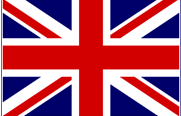
Who controlled British Propaganda?
The Ministry of Information co-ordinated all of Britain's propaganda.
The Ministry of Information was located in Senate House at the University of
London.
It was established at the outbreak of war in 1939.
It's primary purpose was to maintain the country's morale.
Propaganda the Ministry produced included posters, films, radio broadcasts,
pamphlets, newspaper articles and advertisements.
Who was the Minister of Information?
Lord Macmillan (Sept 1939 - Jan 1940)
Sir John Reith (Jan 1940 - May 1940)
Alfred Duff Cooper (May 1940 - July 1941)
Brendan Bracken (July 1941 - May 1945)
Geoffrey Lloyd (May 1945 - July 1945)
Edward Williams (August 1945 - March 1946)
What themes did British people experience through propaganda?
- Recruitment of special services
- Recruitment of women
- Production of munitions
- Maintenance of civilian morale
- Security
- Careless Talk Costs Lives
- Saving money
- Salvaging
- Make Do and Mend
- Rationing
- Growing your own food
- Blackout promotion
More information on some of these themes follows:
Recruitment of special services
General recruitment propaganda was not needed during the Second World War as the government had introduced male conscription several months before the outbreak. However, recruitment posters were still prominent. They instead aimed to promote specialist services, in particular aimed towards women. Other recruitment propaganda concerned agricultural and industrial output.
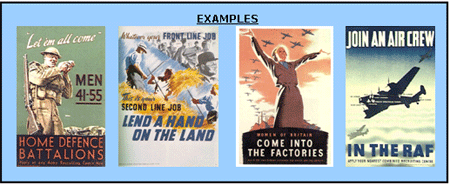
Recruitment of Women
Due to the male conscription introduced, Britain desperately needed people to replace the men in all of their work to ensure that the country kept running. This was especially needed in areas such as munitions manufacture which was clearly essential throughout the war. This therefore meant that propaganda was produced that was specifically aimed at women. The propaganda aimed at women tried to appeal to the patriotism they would have felt and the desire to be actively involved with the war effort.
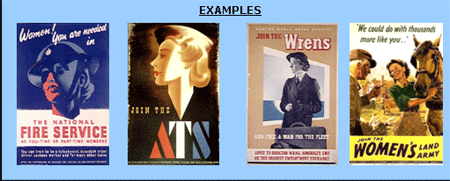
Production of Munitions
The Second World War was far more technological than any before it, and so there was a great emphasis on the production of weapons. Tanks, aircraft, ships and other munitions needed to be produced quickly in factories in Britain to be used in the war. Increasing the efficiency and output of munitions factories was a vital part of the war effort and was prominent in propaganda.
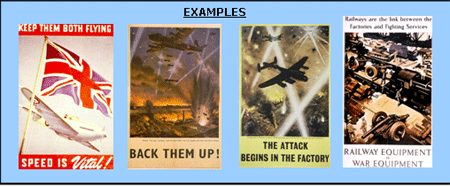
Maintenance of civilian morale
The Second World War was a total war, more than any other warfare before it. It involved not only armed forces, but also civilians too. They contributed to war effort, and were also targeted by bombers. The maintenance of morale was a vital part of the war effort and was where much of British propaganda was targeted. The government, in particular Winston Churchill recognised the importance of 'good spirit' and patriotism within Britain and always tried to promote this - with his frequent visits to derelict cities recovering from a bomb raid and boosting speeches.
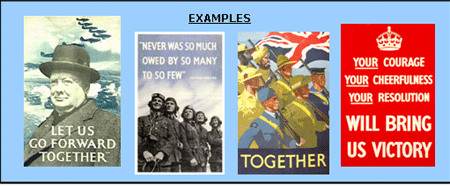
Security
At the outbreak of war, the government became increasingly worried about people working or spying for the enemy within Britain. As a result, the Ministry of Information began a campaign called 'Careless Talk Costs Lives.' Many of the posters were designed to be funny in order to help people to understand their message. Another famous slogan used was 'Keep Mum - she's not so dumb.' The idea was to encourage people to not gossip or talk about the events of the war. The 'Careless Talk' campaign was very successful, mainly because it was easily understood by the British public
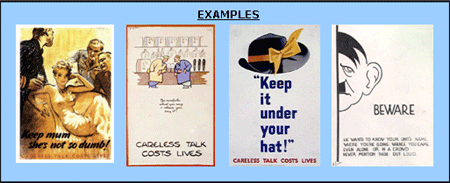
Salvaging
Britain relied on resources being imported before, and throughout the war. Thus German submarines and aircraft seized the opportunity to damage the British defences by preventing and destroying these deliveries. This meant that raw materials, fuel and even food were in limited supply thus affecting the production of weapons and the war effort in general. In response to this, the government attempted to make the country as self-sufficient as possible. Information campaigns were introduced to encourage people to make better use of their resources at home. Posters, leaflets and slogans were published, reminding everyone that they had a part to play in the war effort. One of the most famous campaigns of the Second World War was 'Saucepans for Spitfires' where people were asked to donate aluminium pans to be melted down and used in aircraft production. This campaign also worked well to keep morale high, as people felt they were making a valuable contribution. In reality however, the government didn't need anymore aluminium
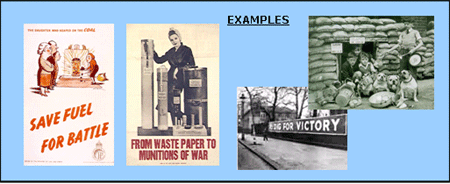
Rationing and Growing Your Own Food
With Britain being an Island, Hitler believed he could essentially cut them out of existence by stopping any imports of food (and other supplies). The government limited the amount of ships coming into Britain to protect the supplies; however this left quite severe shortages of food for the British people. Owing to this, the government introduced the policy of rationing in January 1940 and produced propaganda to convince people that it was a good idea. The government tried to encourage people to 'Dig for Victory' when the campaign started in October 1939. It was one of the most famous campaigns of the war and encouraged people to use every spare piece of land, including gardens, to grow vegetables.
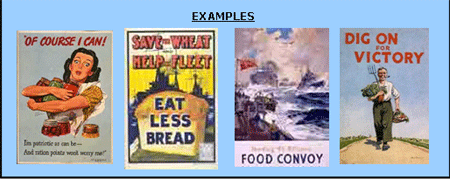
WW2 Home | Propaganda | Effects of Propaganda
Page last updated: 25th February 2014
